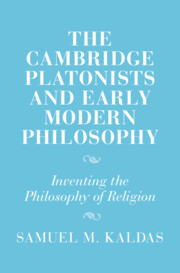Book contents
- The Cambridge Platonists and Early Modern Philosophy
- Cambridge Studies in Religion and Platonism
- The Cambridge Platonists and Early Modern Philosophy
- Copyright page
- Dedication
- Contents
- Acknowledgements
- Note on the Text
- Abbreviations
- Introduction: The Cambridge Platonists and Philosophy of Religion
- Part I The Origins of Cambridge Platonism
- Part II Rival Conceptions of God and Goodness:
- 5 Goodness and the Will of God:
- 6 Is God an Arbitrary Tyrant?
- 7 Righteousness Real and Imagined:
- Part III The Religious Epistemology of the Cambridge Platonists
- Conclusion: The Cambridge Platonists as Early Modern Christian Platonists
- References
- Index
6 - Is God an Arbitrary Tyrant?
Platonic Participation versus the Decree of Reprobation
from Part II - Rival Conceptions of God and Goodness:
Published online by Cambridge University Press: 09 May 2024
- The Cambridge Platonists and Early Modern Philosophy
- Cambridge Studies in Religion and Platonism
- The Cambridge Platonists and Early Modern Philosophy
- Copyright page
- Dedication
- Contents
- Acknowledgements
- Note on the Text
- Abbreviations
- Introduction: The Cambridge Platonists and Philosophy of Religion
- Part I The Origins of Cambridge Platonism
- Part II Rival Conceptions of God and Goodness:
- 5 Goodness and the Will of God:
- 6 Is God an Arbitrary Tyrant?
- 7 Righteousness Real and Imagined:
- Part III The Religious Epistemology of the Cambridge Platonists
- Conclusion: The Cambridge Platonists as Early Modern Christian Platonists
- References
- Index
Summary
For many anti-Calvinists, including the Cambridge Platonists, the Calvinist doctrine of double predestination entailed unacceptable conclusions about the character of God. Inspired by the fractious political climate, seventeenth-century English anti-Calvinists frequently accused the Calvinists of making God into an ‘arbitrary tyrant’, one who imposed his arbitrary will upon a hapless creation, unbound by any principles of justice or goodness. After considering the political and theological background from which this anti-tyrannical discourse emerges, this chapter examines the ways in which, in their attacks on the doctrine of double predestination, Benjamin Whichcote, Henry More, Ralph Cudworth and John Smith all appeal to an explicitly Platonic notion of God’s unwavering intention to communicate his goodness to creatures as far as they are able to receive it.
Keywords
- Type
- Chapter
- Information
- The Cambridge Platonists and Early Modern PhilosophyInventing the Philosophy of Religion, pp. 141 - 175Publisher: Cambridge University PressPrint publication year: 2024

